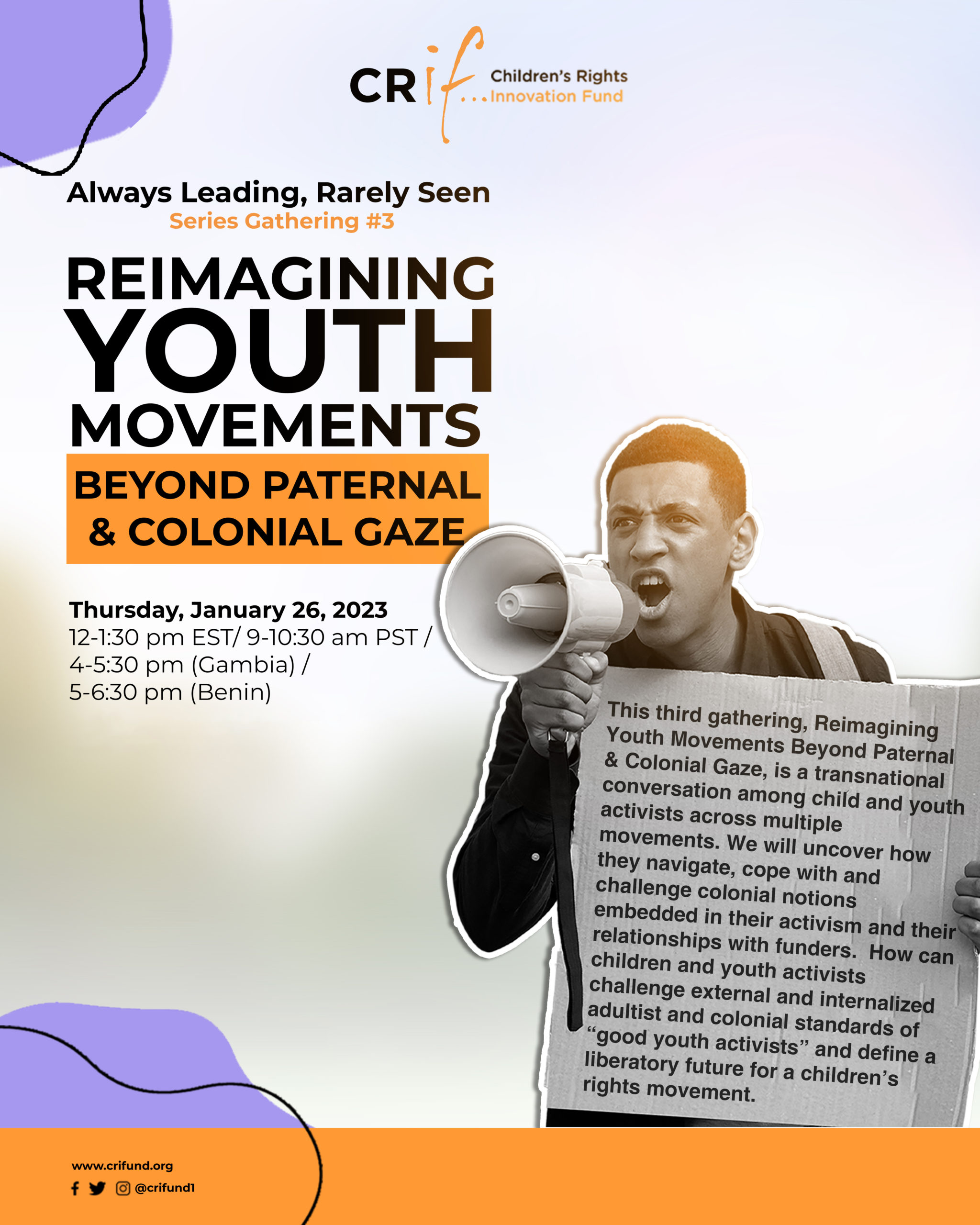

1st February 2023
The world has made significant progress in the recognition and protection of children and youth rights, but much of it remains within the confines of colonial or patriarchal standards.
On the 26th January 2023, the Children’s Rights Innovation Fund (CRIF) brought together a global community of child and youth activists over zoom to Reimagine Children and Youths’ Rights Beyond Colonial and Paternal Gaze. This third gathering of the Always Leading, Rarely Seen series was an opportunity to stake claim to a radical and intersectional vision for children’s rights- one that contends with racism and neo-colonialism as root causes of children’s vulnerability.
According to the Executive Director of CRIF, Dr. Ramatu Bangura, “CRIF holds spaces like this because it wants to affect change with young people where they are at the center of the work for their own liberation.”
The panelists– including Chernor Bah (Co-Founder of Purposeful), Chanceline Mevowanou (Eyala), Otibho Obianwu (Director of Programs, Urgent Action Fund for Women’s Human Rights) and Janvieve Williams-Comrie (Executive Director of AfroResistance)– started off by sharing their leadership experiences and how systemic inequalities leave some children and youth marginalized from the funding they need for their activism.

To move beyond such limiting frameworks- according to Chernor Bah- means activists and funders must embrace a more inclusive and intersectional approach to children and youth rights. This also requires them to recognize the multiple and intersecting forms of oppression and discrimination that children and youth face, and take into account their diverse identities and experiences.
“The idea that the intersectional [nature of our movements] is ‘too much’ is in and of itself dehumanizing and we must seek to embrace inclusivity in our struggle for liberation.” – Chernor Bah
Janvieve Williams-Comrie noted that rather than receive funding on the merit of their work, that child and youth activists are pressured to repeatedly re-tell stories of trauma and anguish to be taken seriously. Meanwhile, Otibho Obianwu put emphasis on creating new spaces where child and youth activists can assert and operationalize their desires to transform funding systems rooted in white supremacy. Like leaders across movements, child and youth activists also demand access to flexible resources.
“CRIF as a funder is determined to move resources to young people in the ways that they would want those resources to be moved for the movements that they themselves center and prioritize.“ added Dr. Ramatu Bangura
Also, Chanceline Mevowanou implored both funders and activists to be clear about the future they want to build for children and youth, rise up and act and work together. She further highlighted that “Funding is however not a question of how we access the money but how we are going to use the money. Otherwise, we will always be oppressed and still remain in the same place of our struggle”.

Well-moderated by CRIF’s Senior Program Officer for Grantmaking and Constituency, Gabrielle Bailey, the two-hour event also featured an open invitation for young participants to share their perspectives and experiences in their journey towards liberation through community activism and service. The event came to its culmination with live poetry written by CRIF’s Event and Program Coordinator Besty Peréz and inspired by conversation between and among panelists and attendees.
Reimagining children and youth rights beyond colonial or patriarchal standards is essential for creating a more inclusive and equitable future for all. This requires a shift in mindset and a commitment to valuing the perspectives and voices of children and youth, embracing intersectionality, promoting equity, and addressing power imbalances. Only then will we be able to build a world in which all children and youth can thrive and reach their full potential.
